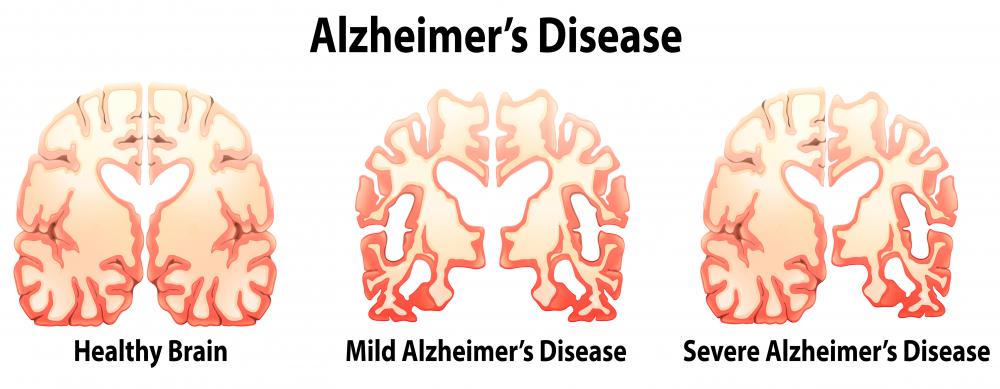At WiseGEEK, we're committed to delivering accurate, trustworthy information. Our expert-authored content is rigorously fact-checked and sourced from credible authorities. Discover how we uphold the highest standards in providing you with reliable knowledge.
What is the Connection Between Alzheimer's and Psychosis?
Psychosis is a condition where people lose touch with reality, often having impossible ideas, or delusions, and experiencing hallucinations, where things are perceived which do not actually exist. The condition frequently occurs in people who have Alzheimer's disease, especially in the later stages of the illness. Alzheimer's is a disease where memory is impaired and thinking becomes difficult, which can affect recognition, speech, planning and movement. As the disease progresses, psychosis may develop in up to 50 percent of individuals, sometimes together with agitation and aggression. It is thought that, when Alzheimer's and psychosis occur together, this may represent a specific type of Alzheimer's disease, which could be linked to certain genes.
Different types of psychosis are associated with different diseases. In the case of psychosis and schizophrenia, what are called auditory hallucinations are more common, where a person hears things, typically voices, which are not really there. With Alzheimer's and psychosis, people more often experience visual hallucinations, seeing things which do not exist. Sometimes the hallucinations are pleasant, especially early on in the disease, often consisting of sightings of children or pets. As Alzheimer's progresses, the nature of the psychosis symptoms can change to become more upsetting.

While in schizophrenia the delusions experienced are often bizarre, with Alzheimer's and psychosis, any delusions commonly relate to everyday matters, such as one's home. Relatively often, delusions arise where people are convinced that they do not really live in their own house, but have another home elsewhere. It is also fairly common for a spouse to be misidentified and thought to be someone else. In a form of paranoid psychosis, a person with Alzheimer's may experience the delusion that people are sneaking into the home and stealing items.

Treatment in a person suffering from Alzheimer's and psychosis aims to reduce psychotic symptoms, while lowering the risk of unwanted side effects that would affect the person's quality of life. Possible complications of drug treatment can include drowsiness, abnormal movements, heart problems and changes in blood pressure, possibly leading to falls. Some authorities believe it is better to reserve medication for extreme cases and emergencies, and to use other methods of managing psychosis instead. Alternative approaches involve educating caregivers and modifying the routine and environment of the person with Alzheimer's. Strategies which have been shown to work include having a regular routine, in surroundings that are not too stimulating or too boring, avoiding setting up situations which are known to trigger psychotic symptoms, and learning how to prevent psychotic behaviors from escalating when they arise.
AS FEATURED ON:
AS FEATURED ON:

















Discussion Comments
@ZipLine-- Yes, my dad. We are in the same situation as you.
How long do the psychotic episodes usually last for your dad? My dad's lasts for half an hour to an hour. When it happens, we call the social services worker and his doctor. He's actually been doing really well lately because his doctor put him on an anti-psychotic drug.
Psychosis is very common among Alzheimer's patients and unfortunately they can become violent. If at any point you fear for your safety, don't hesitate to call the police. I know it's sad, but during psychosis, our loved ones are not aware of what they're doing.
Does anyone here have a loved one who becomes aggressive during psychotic episodes? What do you do when it happens?
My dad has Alzheimer's (stage 5) and recently started experiencing psychosis. He becomes violent.
I had a distant relative who had an advanced form of Alzheimer's and psychosis. During the worst stage, she was convinced that she was married with six kids and had a home. She would even give an address for it. In reality, she had never been married and she didn't have any kids.
She was staying in a home and the doctors treated her psychosis with medications. She was better on some days and worse on others. I went to see her a couple of times when she was in the worst stage and she passed away soon after.
I wish there was an effective Alzheimer's treatment. So many people are suffering so much because of it.
Post your comments